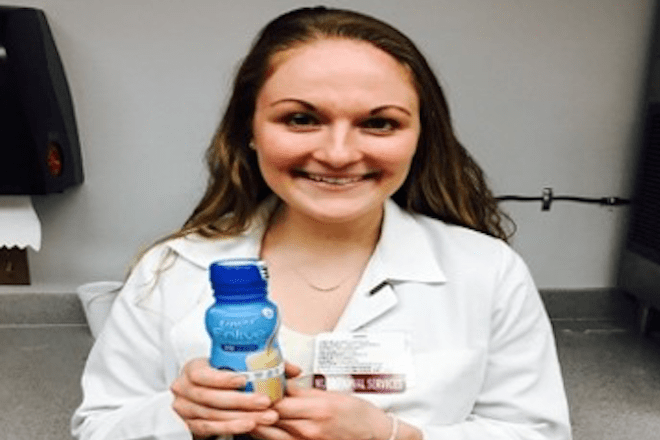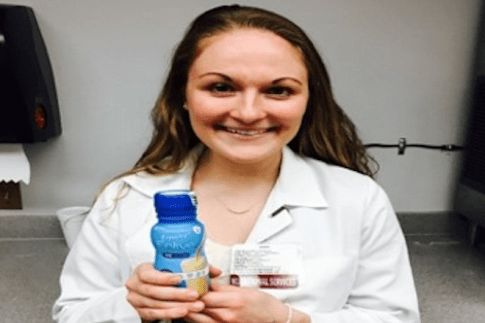
Nutrition
Nutritionists inspire people and their communities to make healthy food choices for wellness, enhanced sports performance, and to prevent and treat disease.
- Degrees & Offerings
-
- B.S.
- Location
-
- Bloomsburg
- Lock Haven
- Mansfield
- Department
- Program Contact
-
Program Coordinator and Assistant Professor of Nutrition
Major Showcase Day
Get a behind-the-scenes look at our program during the Major Showcase Day on Thursday, April 17, 2025 on the Mansfield campus. Space is limited, register today!
Program Overview
- The field of nutrition focuses on the study of how food and dietary choices impact human health and well-being.
- Nutritionists and dietitians work to promote optimal nutrition and develop dietary plans that meet individuals' specific needs, whether it's for general health, weight management, or managing specific health conditions. They assess dietary habits, provide nutrition education, and offer guidance on making healthier food choices.
- Nutrition plays a crucial role in preventing and managing various health issues, and professionals in this field work in diverse settings, including hospitals, schools, public health agencies, and private practice, to help individuals and communities lead healthier lives through proper nutrition.
- The nutrition program prepares students to complete advanced degrees in the field, qualify for post-baccalaureate internships as well as seek employment upon graduation. Career opportunities in this growing field include jobs as clinical dietitians, food-service directors, sports nutritionists, corporate nutritionists, private practice dietitians, wellness and weight control experts, and community dietitians in public and private organizations.
- Continue your climb in our M.S. Applied Exercise Physiology! This program will build on your degree in Nutrition and prepares you for careers in areas such as Clinical Exercise Physiology, Nutrition, Corporate Fitness and Wellness, Health and Fitness Promotion, and Strength and Conditioning, as well as Teaching and Research in Higher Education.
Course Delivery Format
Bloomsburg
Face-to-Face
Online
Hybrid
Lock Haven
Face-to-Face
Online
Hybrid
Mansfield
Face-to-Face
Online
Hybrid
Clearfield
Face-to-Face
Online
Hybrid
Concentrations
Dietetics
- Available at Mansfield in Face-to-Face, Online, and Hybrid formats.
- For those wishing to become registered dietitians (or interested in obtaining an entry-level job in the field of nutrition or food service management). It is designed to teach students a varied background in nutrition.
- Completion of Dietetics Concentration prepares students for a rewarding career in nutrition and dietetics. Career opportunities in this growing field include jobs as food service directors, nutritionists in schools and fitness facilities, food and nutrition experts for food manufacturers or grocery store chains, clinical dietitians, and wellness and weight control programs. Many Dietetics graduates have found employment through community programs such as the Women, Infants, and Children (WIC) program, or are employed in a variety of public and private organizations.
- This program provides specialized courses in life cycle nutrition, community nutrition, advanced nutrition, medical nutrition therapy, nutrition education and counseling, food science, food service, chemistry, and biology.
Sports Nutrition
- Available at Bloomsburg, Lock Haven, and Mansfield in Face-to-Face, Online, and Hybrid formats.
- For those wishing to work in fitness and sports. The Sports Nutrition concentration is ideal for students who are looking to pursue a graduate degree in Physical Therapy, Occupational Therapy, Chiropractic Care, or graduate studies, and want a strong background in nutrition. It is also designed for students who wish to prepare for careers in corporate wellness centers, fitness centers, and university and commercial athletic teams.
- Completion of Sports Nutrition Program prepares students for careers in this rapidly growing field. This program is ideal for students who wish to work with healthy and active individuals and groups, or those who are seeking to develop or rebuild an active, healthy lifestyle.
- This program provides a solid foundation for students who wish to study community-based health, wellness, and athletic performance. Individuals who hope to become Registered Dietitian-Nutritionists must complete the dietetics concentration or take additional courses that will qualify them to apply for a post-baccalaureate internship.
Courses and Curriculum
Degree Requirements Degree Works
Note: Degree requirements effective for enrolled students beginning Fall 2023. All enrolled students, including matriculating students prior to Fall 2023, can review their degree program requirements and track progress to degree completion with our degree audit and advisement tool, Degree Works.
Degree Requirements Degree Works
Note: Degree requirements effective for enrolled students beginning Fall 2023. All enrolled students, including matriculating students prior to Fall 2023, can review their degree program requirements and track progress to degree completion with our degree audit and advisement tool, Degree Works.
Nutrition and dietetics students are subject to all University academic requirements. Information on the Nutrition and Dietetics concentration and degree requirements can be found on the program degree map. The following academic requirements apply only to those continuing in the Nutrition and Dietetics Program.
- Courses required for the B.S. in Nutrition: Dietetics concentration may not be taken Pass/Fail.
- Nutrition and Dietetics courses may be repeated once. Failure to achieve a "C" grade or better after taking the same course for a second time will block the student from earning the DPD Verification Statement. If the course is failed twice, the student will not be able to earn the Nutrition degree.
- Requirements for the B.S. in Nutrition: Dietetics concentration must be completed in 7 years, or the student may need to repeat certain courses.
The following academic standards stated must also be met to receive a Verification Statement. This statement is required for an Accreditation Council for Education in Nutrition and Dietetics (ACEND) dietetic internship or supervised practice program. It may be required by Future Education Graduate Programs and Coordinated Programs in Dietetics, state licensure, and in some states for certification. It may also be required by potential employers.
- Students must meet all DPD course KRDN learning outcomes benchmarks with a grade of 70% or higher. Failure to achieve a 70% or better will require remediation (See Remediation Policy for further details).
- Students must earn a minimum GPA of 2.7 upon graduation.
- A grade of "C" or above is required in all nutrition and dietetics (NUTR) courses or the course must be repeated.
- Students must earn their bachelor's degree in nutrition with a concentration in Dietetics.
Additional information about Verification Statements is available on the ACEND website.
Students must meet all clinical agency health requirements. These may include background checks, specific immunizations, urine drug testing, and a respirator fit test. Students will be expected to cover the costs of background checks, immunizations, urine drug testing, and respirator fit test.
Degree Requirements: Nutrition
Core Courses
| Course | Credits |
|---|---|
| NUTR 200 Introduction to Nutrition | 3 Credits |
| NUTR 205 Principles of Food Science | 3 Credits |
| NUTR 310 Nutritional Assessment and Medical Terminology | 3 Credits |
| NUTR 315 Life Cycle Nutrition | 3 Credits |
| NUTR 320 Community Nutrition | 3 Credits |
| NUTR 325 Nutrition Counseling and Education | 3 Credits |
| NUTR 415 Advanced Nutrition | 3 Credits |
| NUTR 420 Nutrition Research Seminar | 3 Credits |
| Total Credits | 24 Credits |
Nutrition: Dietetics (B.S.): 120 s.h.
The Dietetics Concentration is for students who wish to become registered dietitians and seek a varied background in nutrition.
Required Courses
| Course | Credits |
|---|---|
| NUTR 300 Cultural Nutrition | 3 Credits |
| NUTR 335 Nutrition Organization and Management | 3 Credits |
| NUTR 400 Medical Nutrition Therapy I | 3 Credits |
| NUTR 405 Medical Nutrition Therapy II | 3 Credits |
| NUTR 410 Quantity of Food Production | 3 Credits |
| HLSC 115/BIOL 180 Anatomy and Physiology I | 4 Credits |
| HLSC 120/BIOL 181 Anatomy and Physiology II | 4 Credits |
| BIOL 235 Allied Health Microbiology | 4 Credits |
| CHEM 116 Physiological Chemistry I: General Chemistry | 4 Credits |
| CHEM 117 Physiological Chemistry II: Organic and Biological | 4 Credits |
| CHEM 251 Nutritional Biochemistry | 4 Credits |
| STAT 141 Introduction to Statistics | 3 Credits |
| ACC 221 Principles of Accounting I | 3 Credits |
| Total Credits | 48 Credits |
Total Semester Hours for the major (Core plus Concentration): 72 credits
Sample Schedule
Degree Requirements: Nutrition
Core Courses
| Course | Credits |
|---|---|
| NUTR 200 Introduction to Nutrition | 3 credits |
| NUTR 205 Principles of Food Science | 3 credits |
| NUTR 310 Nutritional Assessment and Medical Terminology | 3 credits |
| NUTR 315 Life Cycle Nutrition | 3 credits |
| NUTR 320 Community Nutrition | 3 credits |
| NUTR 325 Nutrition Counseling and Education | 3 credits |
| NUTR 415 Advanced Nutrition | 3 credits |
| NUTR 420 Nutrition Research Seminar | 3 credits |
| Total Credits | 24 credits |
Nutrition: Sports Nutrition (B.S.): 120 s.h.
Required Courses
| Course | Credits |
|---|---|
| NUTR 300 Cultural Nutrition | 3 credits |
| NUTR 330 Sports Nutrition | 3 credits |
| NUTR 360 Kinesiology/EXER 255 Func. Anatomy | 3 credits |
| NUTR XXX Elective | 3 credits |
| EXER 378 Exercise Physiology | 3 credits |
| HLSC 115/BIOL 180 Anatomy and Physiology I | 4 credits |
| HLSC 120/BIOL 181 Anatomy and Physiology II | 4 credits |
| CHEM 116 Physiological Chemistry I: General Chemistry | 4 credits |
| CHEM 117 Physiological Chemistry II: Organic and Biological | 4 credits |
| CHEM 251 Nutritional Biochemistry | 4 credits |
| STAT 141 Introduction to Statistics | 3 credits |
| ACC 221 Principles of Accounting I | 3 credits |
| Total Credits | 41 credits |
Total Semester Hours for the major (Core plus Concentration): 65 credits
Sample Schedule
- Students must earn a Bachelor of Science degree in Nutrition, Dietetics option, and earn their Didactic Program in Dietetics (DPD) verification statement from CU – Mansfield DPD to be eligible to apply for an ACEND accredited dietetic supervised practice program. Information on the Nutrition and Dietetics concentration and degree requirements can be found on the program degree map.
- Be accepted to and complete an ACEND accredited dietetic supervised practice program after completing the degree at CU – Mansfield.
There are 3 types of accredited Dietetic Supervised Practice Programs that students can choose to apply to:
- Dietetic Internship
- Future Education Model Graduate Program
- Coordinated Master’s Program
Dietetic Supervised Practice Programs require a minimum of 1,000 hours of ACEND accredited supervised practice program. There are 3 major areas of dietetics which include clinical dietetics, community and nutrition education, and food-systems management. Additional experiences that might be provided include research, sports nutrition, pediatrics, culinary nutrition, retail nutrition, informatics, food sustainability, and other related areas. The additional experiences vary by program. For more information, view the ACEND Accredited Program Directory.
Students apply for dietetic supervised practice programs during their senior year of the baccalaureate degree. Dietetic supervised practice programs are highly competitive.
- Pass the Registration Examination for Registered Dietitian Nutritionists (RDN). The Registration Examination is a national board registration examination, which leads to the credential of Registered Dietitian Nutritionist. The Commission of Dietetic Registration (CDR) sets the requirements for the RDN exam. The RDN exam is a computer-based exam that covers the content in the three major areas of dietetics: Clinical, Community, and Food Service and Food-systems Management. Once students complete the dietetic supervised practice programs and earn the dietetic supervised practice program’s Verification Statement, they are eligible to sit for the RDN examination.
Effective January 1, 2024, the Commission on Dietetic Registration (CDR) requires a minimum of a master's degree (the master’s degree does not need to be in the area of nutrition) to be eligible to take the credentialing exam to become a registered dietitian nutritionist (RDN). For more information about this requirement visit the CDR website. In addition, CDR requires that individuals complete coursework and supervised practice in program(s) accredited by the Accreditation Council for Education in Nutrition and Dietetics (ACEND). Graduates who successfully complete the ACEND-accredited Didactic Program in Dietetics (DPD) at CU - Mansfield are eligible to apply to an ACEND-accredited supervised practice program.
In some states, licensure or certification is required for registered dietitian-nutritionists. State requirements vary by state. The Commission on Dietetic Registration (CDR) provides information about state licensure requirements click here. Pennsylvania has licensure requirements, which can be viewed here. CDR provides an overview between CDR certification and state licensure; click here for more information.
For more information about educational pathways to become a RDN click here.
Verified graduates who do not complete ACEND-approved dietetic internships after graduation are eligible to take the national dietetic technician, registered (DTR) exam and work as dietetic technicians in long-term care, community nutrition programs such as WIC, other health care settings; food service managers in schools, health care institutions, and additional settings. Graduates may also continue their education by attending graduate school.
Mission Statement
The mission of the CU Didactic Program in Dietetics (DPD) is to provide graduates with the evidence-based knowledge and skills foundational to supervised practice leading to eligibility for the Commission for Dietetic Registration (CDR) credentialing exam to become Registered Dietitian Nutritionists (RDN). The program also prepares graduates to become Dietetic Technicians, Registered (DTR) and to pursue entry-level careers in foodservice management, community nutrition; and/or to attend graduate school in a complex and changing global society.
Program Goal #1
Program graduates will be adequately prepared to apply for acceptance into accredited supervised practice programs.
Objective 1.1: At least 80% of students complete program requirements within six years (150% of planned program length).
Objective 1.2: At least 40 percent of program graduates apply for admission to a supervised practice program prior to or within 12 months of graduation.
Objective 1.3: Of program graduates who apply to a supervised practice program, at least 60 percent are admitted within 12 months of graduation.
Objective 1.4: The program’s one-year pass rate (graduates who pass the registration exam within one year of first attempt) on the CDR credentialing exam for dietitian nutritionists is at least 80%.
Objective 1.5: Within 12 months of graduation, 75% of the graduates’ supervisors who complete a survey will agree or strongly agree that the graduates are prepared for their current position (e.g., Supervised Practice, Graduate Program, or Employment).
Objective 1.6: Within 12 months of graduation, 75% of the graduates who complete a survey will agree or strongly agree that they are prepared for their current position (e.g., Supervised Practice, Graduate Program, or Employment).
Program Goal #2
Program graduates applying to graduate or pre-professional school will be accepted, and those seeking entry-level employment in nutrition, or a related field will be employed.
Objective 2.1: Of those who do not apply or are accepted into supervised practice programs, at least 75% of graduates will apply to graduate schools, or pre-professional schools, or seek employment within 12 months of graduating from the program.
Nutrition Student Learning Objectives
Our students will:
- Demonstrate the ability to use and interpret current research in developing knowledge of nutrition, sports nutrition, and dietetic practice.
- Demonstrate the ability to use oral and written communications effectively as individuals and in group settings requiring collaboration and teamwork.
- Demonstrate problem-solving and critical thinking skills related to medical nutrition therapy.
- Demonstrate their ability to apply management principles using problem-solving and critical thinking skills in hypothetical practice situations.
- Exhibit understanding of public policy and its effects on health care systems.
- Demonstrate the ability to develop nutrition prescriptions for a variety of individuals and groups
Program outcomes data are available upon request.
Student Learning Outcomes
BS Nutrition Dietetics Program
- Demonstrate the ability to use and interpret current research in developing knowledge of nutrition, sports nutrition, and dietetic practice.
- Demonstrate the ability to use oral and written communications effectively as individuals and in group settings requiring collaboration and teamwork.
- Demonstrate problem-solving and critical thinking skills related to medical nutrition therapy.
- Demonstrate their ability to apply management principles using problem-solving and critical thinking skills in hypothetical practice situations.
- Exhibit understanding of public policy and its effects on health care systems.
- Demonstrate the ability to develop nutrition prescriptions for a variety of individuals and groups nutrition therapy.
BS Nutrition Sports Nutrition Program
- Demonstrate the ability to use and interpret current research in developing knowledge of nutrition, sports nutrition, and dietetic practice.
- Demonstrate the ability to use oral and written communications effectively as individuals and in group settings requiring collaboration and teamwork.
- Exhibit understanding of public policy and its effects on health care systems.
- Demonstrate the ability to develop nutrition prescriptions for a variety of individuals and groups.
- Assess and make sports-specific recommendations for athletes.
BS Nutrition Minor
- Promote nutrition knowledge among non-nutrition majors Promote basic knowledge of foods among non-nutrition majors
- Students are able to Apply professional guidelines to a practice scenario Use the nutrition care process to make decisions, to identify nutrient related problems, and determine and evaluate nutrition interventions.
- Develop food and nutrition interventions to affect change and enhance wellness in diverse individuals and groups
- Develop an educational session or program / educational strategy for a target population
The Nutrition and Dietetics Program has been in existence at Mansfield since the 1970's. The Commonwealth University-Mansfield Nutrition and Dietetics program is currently accredited by the Accreditation Council for Education in Nutrition and Dietetics (ACEND) (Formerly the Commission on Accreditation for Dietetics Education of the American Dietetic Association or CADE) the accrediting agency for the Academy of Nutrition and Dietetics, 120 South Riverside Plaza, Suite 2000, Chicago, IL 60606-6995, 800/877-1600 ext. 5400.
This program provides the didactic instruction required to meet the ACEND (Formerly CADE) Foundation Knowledge and Skills for Entry-Level Dietitians and Standards of Education. This program allows graduates to apply for an Accreditation Council for Education in Nutrition and Dietetics (Formerly Commission on Accreditation for Dietetics Education) supervised practice program, which leads to eligibility to write the registration examination for dietitians.
Effective January 1, 2024, the Commission on Dietetic Registration (CDR) will require a minimum of a master's degree to be eligible to take the credentialing exam to become a registered dietitian nutritionist (RDN).
For more information about this requirement visit CDR's website. In addition, CDR requires that individuals complete coursework and supervised practice in program(s) accredited by the Accreditation Council for Education in Nutrition and Dietetics (ACEND). Graduates who successfully complete the ACEND-accredited Didactic Program in Dietetics (DPD) at CU-Mansfield are eligible to apply to an ACEND-accredited supervised practice program.
In some states, licensure or certification is required for registered dietitian-nutritionists. State requirements vary by state. The Commission on Dietetic Registration (CDR) provides information about state licensure requirements click here. Pennsylvania has licensure requirements, which can be viewed here. CDR provides an overview between CDR certification and state licensure; click here for more information.
For more information about educational pathways to become a RDN click here.
B.S. in Nutrition: Dietetics Concentration - Accreditation
The Commonwealth University – Mansfield dietetics concentration is currently accredited by the Accreditation Council for Education in Nutrition and Dietetics (ACEND) (Formerly the Commission on Accreditation for Dietetics Education of the American Dietetic Association). The last self-study was completed in 2016 and was successfully approved for the maximum 7-year term for accreditation. The program is fully accredited through 12/31/2025.
Accreditation Council for Education in Nutrition and Dietetics (ACEND)
120 South Riverside Dr.
Plaza Suite 2000
Chicago, IL 60606
(312)-899-0040 Ext. 5400
Email: acend@eatright.org
Distance education components for multimodal classes, via Zoom include access to an electronic device (laptop, computer, notepad/iPad, or phone), camera, speakers, and microphone. In addition to accessing Zoom, an electronic device that is capable of logging into an account and/or running software will be needed to access the Learning Management System – CU Brightspace, or any other software/web-based program. When logging into Learning Management System – CU Brightspace, or any other software/web-based program, you will need to use your university email and password. You may need to show your student identification card for online exams/quizzes. All students’ private information will be protected under the Family Educational Rights and Privacy Act of 1974 (FERPA).
Student Opportunities
The nutrition minor provides a strong background in food and nutrition enhancing many fields of study. The minor is especially well suited to students going into healthcare fields but may also be valuable to students going into the fields of psychology, social work, public health education, school education, coaching, journalism, and hospitality and food service management.
- Promote nutrition knowledge among non-nutrition majors
- Students are able to: apply professional guidelines to a practice scenario; use the nutrition care process to make decisions, to identify nutrient related problems, and determine and evaluate nutrition interventions
- Develop food and nutrition interventions to affect change and enhance wellness in diverse individuals and groups
18 S.H.
Program Requirements
- NTR 2211 Introduction to Nutrition
- NTR 3305 Principles of Food Science
- NTR 3314 Life Cycle Nutrition
Select three (3) from
- NUTR 220 Nutrition and Exercise
- NUTR 300 Cultural Nutrition
- NUTR 320 Community Nutrition
- NUTR 325 Nutrition Counseling and Education
- NUTR 330 Sports Nutrition
- NUTR 400 Medical Nutrition Therapy I
- NUTR 405 Medical Nutrition Therapy II
- NUTR 415 Advanced Nutrition
- NUTR 420 Nutrition Research Seminar
Students who major in nutrition may qualify for some of the many of the scholarships offered by Commonwealth University.
There are three scholarships specifically for Nutrition and Dietetics students at Commonwealth University. Nutrition and Dietetics students in their junior year of study may be eligible for additional scholarships available from the Central Pennsylvania Dietetic Association and the American Dietetic Association.
A list of available scholarship opportunities is available through CU Financial Aid.
The scholarship is awarded based on character, scholarship, culture, and service, which is taken from the Mansfield Creed. Faculty and Student Dietetic Association officers rank applicants on these traits.
Miss Keller was a foods instructor in the Home Economics Department and she served as department chairperson.
This scholarship is presented to a student who is majoring in dietetics. The recipient of this scholarship can be either an entering or currently enrolled student who demonstrates strong academic ability and has financial need. This is an $850.00 non-renewable award.
This scholarship is presented to a nutrition and dietetics major. Preference is given to a student from Wyoming or Clinton County.
Careers
There are a variety of career opportunities for graduates of the Nutrition Program at Commonwealth University. Graduates are currently working as clinical dietitians in hospitals and long-term care facilities; as managerial dietitians in food service and clinical nutrition management positions; as community nutritionists in outpatient clinics for health care companies and physicians' offices, at Women, Infants and Children clinics, in community fitness programs; as private practice dietitians and consultants; and as educators and researchers. The jobs mentioned above are only a sample of the potential careers open to students who major in Nutrition at Commonwealth University. Other career options include:
Potential Job Opportunities
- Clinical dietitian in hospital, HMO, or other health care facility
- Consulting dietitian
- Dietitian in a nursing home
- Community dietitian with the Women, Infants and Children Program
- Public health dietitian
- Dietetic educator
- Researcher with food or pharmaceutical companies
- Researcher in a University or hospital setting
- Sports nutritionist with fitness teams or corporate wellness programs
- Pharmaceutical sales representative
- Consumer affairs in food and nutrition related businesses
- Public relations in food and nutrition related businesses
- Product development in food and nutrition related businesses
- Private practice dietitian
- Food service director in a hospital, or other health care facility
- School food service director
- Day-care food service director
- Correctional facility food service director
- Caterer
- Peace Corps worker
- Cooperative extension agent
- Food buyer or distributor
- Food and drug inspector
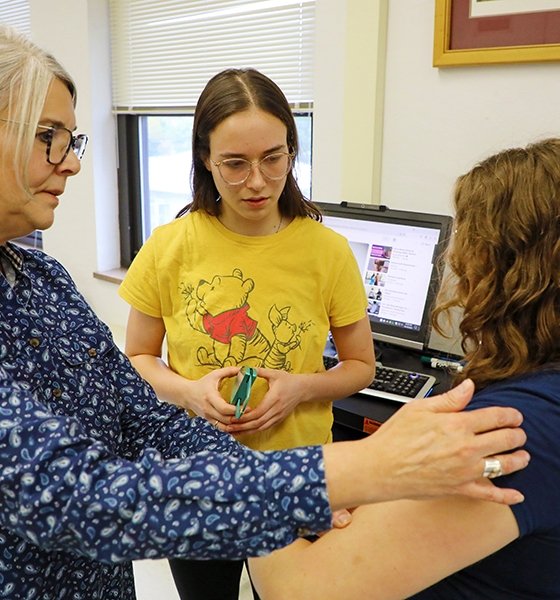
Vision
To provide a student-focused learning environment that allows nutrition students to develop their potential in becoming competent leaders who empower their patients, clients, employees, and communities.
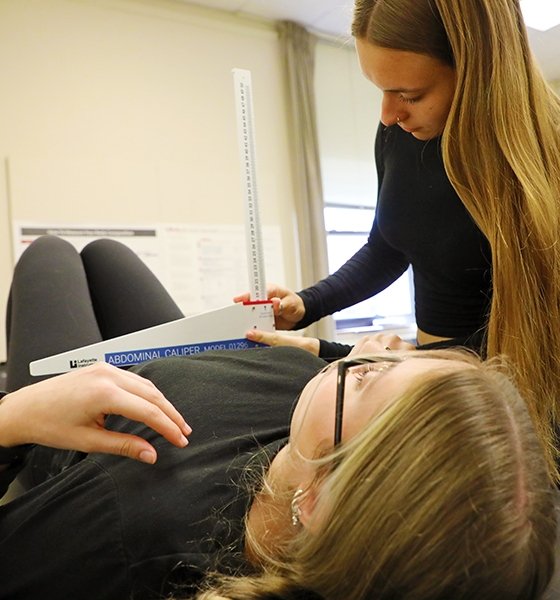
Values
Scholarship: We enthusiastically embrace student learning and believe students should be actively engaged learners in, as well as out, of the classroom. We believe faculty and students should be life-long learners. Character: We provide an environment that encourages personal accountability, integrity, honesty, and courage in an atmosphere, which fosters respect for others students may encounter in their personal and professional lives. Culture: We celebrate the uniqueness of individuals with whom nutrition professionals interact and provide opportunities for students to learn about the unique needs of humans from a variety of backgrounds. Service: We support our local community and embrace service learning, while encouraging students to participate in volunteer activities related to the major.
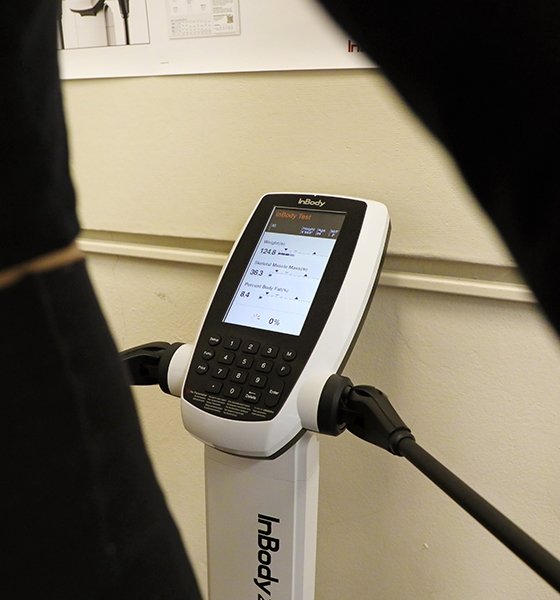
Unique Program Features
Personalize your degree through our two program concentrations — dietetics and sports nutrition. You'll take specialized courses in life cycle nutrition, community nutrition, advanced nutrition, medical nutrition therapy, nutrition education and counseling, food science, food service, chemistry, and biology. Career opportunities in this growing field include clinical dietitians, food-service directors, sports nutritionists, corporate nutritionists, private practice dietitians, wellness and weight control experts, or pharmaceutical sales representatives. You can get involved with student organizations like the Student Dietetic Association, Mansfield University Community Health Club (MUCH), and Future Healthcare Professionals Club. Dietetics concentration is accredited by the Accreditation Council for Education in Nutrition and Dietetics (ACEND).

Program Strengths
According to the Accreditation Council for Education in Nutrition and Dietetics site reviewers during our last 10-year accreditation site visit our strengths include: Highly qualified, hard-working, extremely competent program director who provides a nurturing student-centered learning environment. Supportive, collaborative faculty in related disciplines who fully support the dietetics education program and success of its students Administrators who recognize the program's accomplishments and commitment to quality Articulate enthusiastic and determined students who appreciate the competency of the faculty and quality of the academic program.
Nutrition Contacts
Applying to This Program
Apply
-
Application Process
Review the step-by-step process whether you're a first-year student, transferring to CU, or more.
-
Apply Now
By starting your application, you gain access to your personalized application portal to view your progress.
-
Scholarships
As the largest comprehensive university in north central and northeastern Pennsylvania, CommonwealthU works hard to provide a world-class education that consistently rates among the best values in the nation.
Explore More
-
Explore Commonwealth University
There's no better way to learn more than to experience Commonwealth University for yourself! Set up a campus tour or connect with us virtually.
-
Connect with Your Admissions Counselor
Applying to college is a big step. You have questions, and we have answers!
-
Understanding Financial Aid
Financial Aid can be a complex topic. Our Financial Aid team is here to tell you what you need to know and help you navigate the financial aid process.

